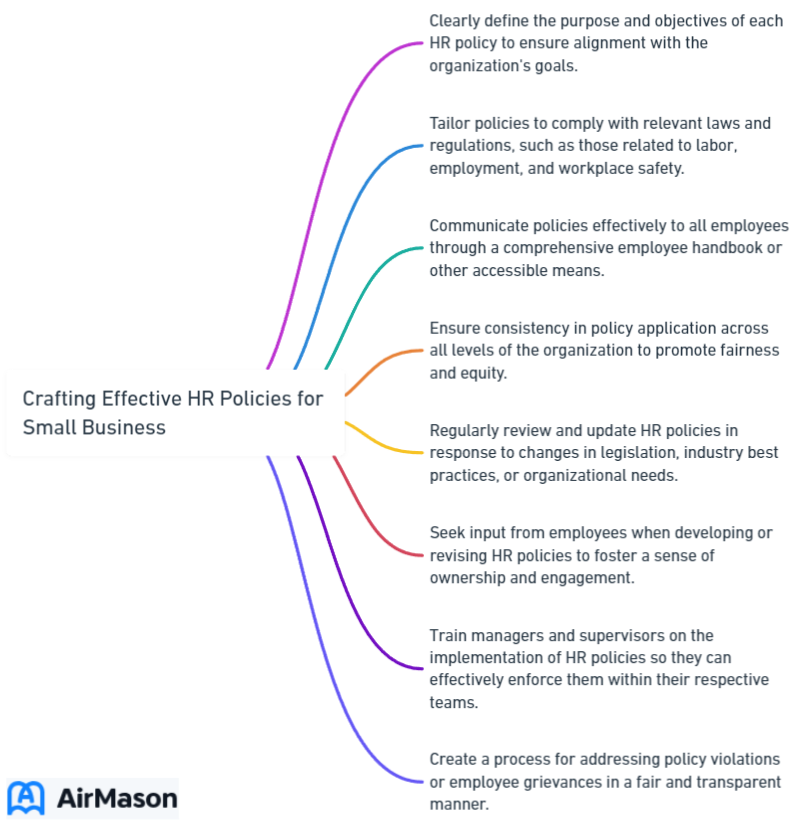
Imagine the immense growth and prosperity your small business could achieve by implementing effective HR policies for small business. Navigating the complex world of human resources is no easy task, but doing so can help your business flourish by keeping employees happy, ensuring legal compliance, and fostering a positive work environment. In this blog post, we’ll guide you through the process of crafting efficient HR policies, tailored specifically for small businesses like yours.
Key Takeaways
- Understanding HR policies is necessary for creating a legal and positive workplace environment.
- Implement key HR policies to promote safety, productivity, and compliance with laws.
- Periodic review of policies required to ensure accuracy and compliance with regulations. Provide training & open communication channels.
 Understanding HR Policies for Small Businesses
Understanding HR Policies for Small Businesses
You’ll soon realize the significance of implementing HR policies as a small business owner, especially when you hire your first employee. While managing a few employees may be feasible with the owner and management taking on HR tasks, as your business grows, it becomes evident that such a task is too much to handle single-handedly. Setting up human resource policies is a key step towards creating a smooth and efficient workplace.
These policies, also known as business policies, are guidelines and regulations set by businesses to employ, train, evaluate, and compensate employees, and are connected to labor laws regulated by federal and state labor boards. HR policies not only diminish the risk of litigation, but also provide direction to supervisors and managers, acting as a means of communication with employees. Some essential policies to consider include:
- Timecard regulations
- Utilization of company resources
- Dress code
- Sexual harassment
Implementing HR policies not only aids in legal compliance, but also promotes a positive work environment. Small businesses may be legally obligated to provide employee benefits such as workers’ compensation, paid time off, and disability insurance. Not only do these policies provide guidance to your employees, but they also help protect your business from potential legal issues and ensure a thriving workplace.

Key HR Policies to Implement
Small business owners should implement key HR policies to ensure compliance with laws, prevent legal issues, and encourage a safe, productive work environment. These HR policies of a company must include:
- Workplace health and safety policy
- Employee code of conduct
- Attendance and time-off policies
- Anti-discrimination and harassment policies
Implementing these policies lays the groundwork for a positive workplace where employees feel secure, respected, and valued. The following sections will provide a deeper insight into these key policies and their benefits for your small business.
Health and Safety Policy
A health and safety policy is paramount to protect employees and comply with OSHA regulations. A comprehensive policy should incorporate safety procedures, directives for reporting accidents and injuries, and any other pertinent information. OSHA, an organization that provides instructions on how to form a secure working environment, can assist your business in developing an effective health and safety policy that protects employees from occupational risks.
Establishing a health and safety policy not only promotes a safer workplace, but also showcases your commitment to employee wellbeing. This policy can help minimize workplace accidents, boost employee morale, and ultimately contribute to the overall success of your small business.
Employee Code of Conduct
An employee code of conduct is key to helping employees understand the expected standards for performance and workplace behavior. This policy should encompass expectations for employee behavior, such as respect for colleagues, adherence to company policies, and appropriate use of company resources. Clearly defining these expectations cultivates a safe and respectful work atmosphere for all employees.
In addition to promoting a positive work environment, a well-defined code of conduct can help protect your small business from potential legal issues, such as claims of discrimination or harassment. Outlining expectations for professional performance and behavior paves the way for a harmonious and productive workplace.
Attendance and Time-Off Policies
Having standardized attendance and time-off policies in place can benefit both your small business and its employees. These policies should encompass expectations for:
- Attendance
- Vacation and sick leave
- Paid time off
- Parental leave
- Bereavement policies
Providing clear guidelines for these written policies aids in maintaining a healthy work-life balance for your employees and reduces potential disputes.
Moreover, attendance policies can help ensure that your small business remains productive and efficient. Establishing clear expectations for punctuality and regular attendance reduces workplace disruptions and ensures a reliable workforce that contributes to your business’s success.
Anti-Discrimination and Harassment Policies
Implementing anti-discrimination and harassment policies is vital for ensuring a safe and inclusive environment for all employees. These policies should encompass distinct delineations of prohibited behavior, processes for submitting grievances, and any other pertinent data. Establishing clear guidelines and consequences for discriminatory and harassing behavior highlights your commitment to creating a respectful and diverse workplace.
Developing and enforcing these policies not only protects your employees, but also safeguards your small business from potential legal disputes. A comprehensive anti-discrimination and harassment policy can help your business maintain a positive reputation, attract top talent, and promote a culture of respect and inclusivity.

Developing an Employee Handbook
An employee handbook is an essential tool for communicating your small business’s policies, procedures, and company culture to both new and current employees. A well-crafted handbook can serve as a valuable resource, effectively communicating your expectations and reducing the likelihood of legal disputes. Establishing and distributing employee handbooks offers a clear reference for employees to consult during times of questions or concerns.
When creating your employee handbook, be sure to include key policies such as health and safety, code of conduct, attendance and time-off policies, and anti-discrimination and harassment policies. Additionally, consider incorporating information about your company’s mission, core values, and any unique aspects of your workplace culture. This can help employees feel connected to your business and its goals, fostering a sense of belonging and loyalty.
In addition to these essential policies, it’s crucial to develop payroll policy and procedures template for your company, ensuring that employees understand how they will be compensated and the processes in place for payroll-related matters. This transparency promotes trust and confidence within your workforce, reinforcing a positive workplace culture.
Regular review and update of your employee handbook are necessary to keep it relevant and compliant with ever-changing laws and regulations. As your small business grows and changes, so too should your handbook. By keeping it current, you can ensure that your employees always have access to the most up-to-date information and guidance.
Navigating HR Regulations and Compliance
Small businesses need to understand and adhere to federal, state, and local HR regulations and labor laws to steer clear of legal disputes and stay compliant. As a small business owner, it’s your responsibility to stay informed about the latest laws and regulations impacting your industry and workforce. Failure to comply with these regulations can result in hefty fines, fees, and legal action.
To help your small business remain compliant, consider the following options:
- Partnering with a Professional Employer Organization (PEO) or HR outsourcing service
- Appointing an internal HR individual
- Seeking assistance from other sources
These options can help alleviate the burden of navigating complex HR regulations, allowing you to focus on growing and managing your business.
Utilizing HR Technology and Support
In today’s fast-paced business world, leveraging HR technology and support services can save time and resources while streamlining your HR functions. From HR software and mobile apps to outsourcing options, these tools can help you manage:
- Employee benefits
- Payroll
- Recruitment and onboarding
- Performance management
- Time and attendance tracking
- Training and development
By utilizing these tools in human resource management, you can handle essential HR tasks more efficiently, like an HR generalist.
Key components of HR technology and HR support include:
- Human Resource Information Systems (HRIS)
- Recruitment and applicant tracking
- Performance management
- Learning and development
- Employee self-service
- Analytics and reporting
- Compliance and legal support
- Mobile and remote access.
Incorporating these tools and services into your small business simplifies HR processes and allows you to concentrate on driving growth and success, while effectively managing your business money.

Periodic Review and Updates of HR Policies
It’s necessary to regularly review and update your human resources policies and procedures manual to keep them relevant, law-compliant, and aligned with your business’s growth and strategy. As your small business evolves, so too should your policies. Staying up-to-date with the latest regulations and industry best practices can help you maintain a thriving workplace and avoid potential legal issues.
In addition to updating your policies, it’s also important to maintain accurate HR compliance documentation. This can be beneficial in the event of litigation or an HR audit. Regular review and update of your policies ensure that your small business stays compliant and is well-prepared for any upcoming challenges.
Training and Communication
Efficient training on HR policies and maintaining open communication channels are key to ensuring policy adherence and addressing concerns in your small business. By providing clear and comprehensive training on key policies such as health and safety, code of conduct, and anti-discrimination and harassment, you can help employees understand their rights and responsibilities in the workplace.
Encourage open communication by providing employees with multiple channels through which they can voice their concerns, ask questions, and provide feedback. Establishing a culture of transparency and openness can help your small business address potential issues before they escalate, helping to maintain a positive and productive work environment.
Summary
In conclusion, crafting effective HR policies for your small business is a critical step in fostering a positive work environment, ensuring legal compliance, and promoting growth and success. By implementing key policies, developing an employee handbook, navigating HR regulations and compliance, leveraging HR technology and support, regularly reviewing and updating policies, and emphasizing training and communication, you can build a strong foundation for your small business’s future. With the right HR policies in place, your business will be well-equipped to overcome challenges and achieve long-term success.
Frequently Asked Questions
What are the 4 C’s of HR policies?
The 4 C’s of HR policies refer to being a Catalyst, Coach, Conductor, and Consultant within the organization, as well as assessing competence, commitment, congruence, and cost effectiveness.
What are the important HR requirements for small business?
Small businesses must adhere to a variety of human resource requirements, such as recruitment and hiring, benefits administration, payroll processing, policy development, employee onboarding and training, performance management, employee relations and legal compliance.
Furthermore, HR must-haves for business success include employee paperwork, handbook, required posters, hiring process, performance reviews, employee development and training, employee recognition and benefits.
Additionally, key HR areas for small businesses include recruitment and retention, compensation and benefits, employee engagement, training and development, and labor law compliance.
What is an example of a HR policy?
HR policies provide structure and consistency in employment matters by addressing topics such as fair compensation, employee grievances, vacation time and leave, health and safety, and break periods.
What are the 5 rules of HR?
The Five Golden Rules of Human Resources are being transparent, training with intention, exceeding expectations, modeling ideal behavior and treating everyone equally.
Why is it essential to have an employee handbook?
Having an employee handbook is essential as it provides employees with clear policies to follow, reduces the risk of legal disputes, and serves as a helpful resource.